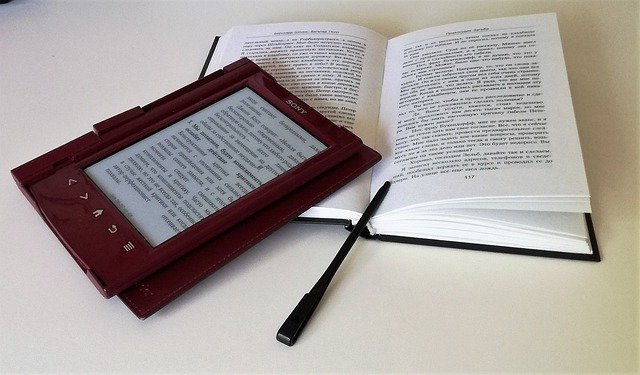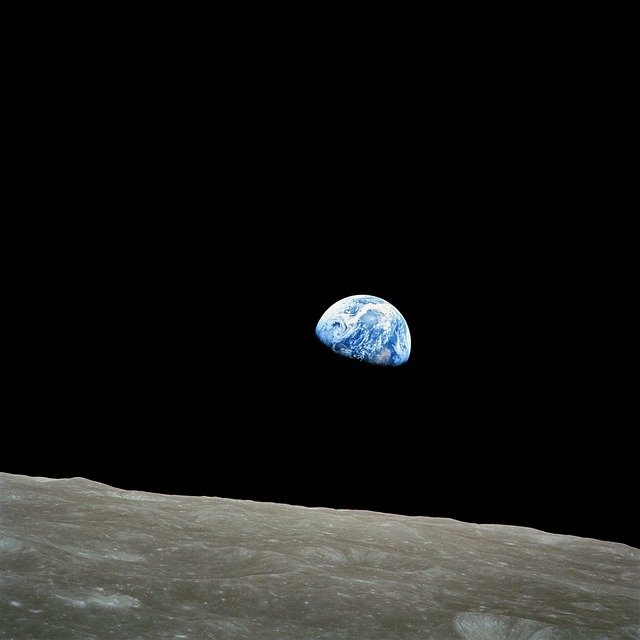

I have recognized a passion for technology for as long as I can remember. It must be because my generation grew up watching with fascination the beginning of the space race. I still remember the colorful, glossy, laminated brochures with the photographs taken from Apollo 11, which showed the view from space of the blue sphere we call Earth, our planet. A feat thanks to modern technology. To this, I must add the impact that, as a child, produced the impact of Sunday animations on television, in black and white, centered on stories where robots and spaceships, full of technological wonders, announced what today seems to become almost reality. At least, as far as androids with generative intelligence and possible manned interstellar travel to remote galaxies in the far reaches of the universe are concerned. These, as yet, remain to be seen.
Wait a minute! I don't want to follow the course of these already dazzling ideas. On the contrary, in this post, I want to elaborate on the primordial technology, the one that has enabled our context, our world. Can you guess? Yes, the word. First, well, I think so, in its primordial form, spoken, and then, written, and that preserved the knowledge gained for generations.
As a book lover, I know that both the analog version, the paper book, and the digital version, the EPUB or similar, besides being pleasurable for me, also provide me with a transforming context that determines the reality in which I live. Let me give you my perspective, for sure, it will have points of encounter with yours.

Source: Image by WikiImages on Pixabay
Just think, in a moment, of a world without words. This does not imply the cancellation of communication. For example, a dog or cat establishes communication with you without uttering a single word. Even a growl and baring of its fangs will give you a clear message that it does not like you, or the wagging or swishing of its tail, the thrill of joy at seeing you. But who has ever seen a dog manning a spacecraft making contact with the docking station or takeoff site? Well, perhaps, Laika, the Space dog of the now-defunct Soviet Union. Ha ha ha ha.
You see my point. Yes, books, replete with characters and symbols, underlie, as cornerstones, the development and success of most modern technologies. Surely, Laika, in the hypothetical collaboration with the Apollo 11 crew, would have been useless in the last-minute consultation of the technical manuals when the spacecraft failed to return to Earth.
What a book! Isn't it a marvelous piece of technology, whether made of wood pulp, silicon, plastic, or glass? Amazing, isn't it?

Source: Image by Hermann Kollinger on Pixabay
Perhaps, the fiction books versed in technologies that had the greatest impact on my youth were those written by Jules Verne, how could I forget “From the Earth to the Moon” or “20,000 Leagues Under the Sea”? Classics of science fiction when they were written, and that today, are patent realities.
Also, in the 90's, I remember reading two technical texts on computer programming. One is on the Basic language, and the other is on algorithm design. With these, and with a lot of self-taught passion, I elaborated my first programs in an advanced portable computer for that time: the Casio PB-1000; which I bought on credit in promissory note. In some box, stored or on a shelf, they will be. So, I owe them their titles and authors. Today, similar and updated books abound in the large digital libraries available on the Web.
Finally, I think that information technology has made it possible to democratize access to the knowledge enclosed in books. What used to be the privilege of a select few are now resources available to anyone with a smartphone in their hands. Even language barriers are falling, thanks to automatic translation. As Uncle Ben said, in the first Spider-Man movie, starring Tobey Maguire: “With great power, comes great responsibility.” That's the enormous power of books, and now, available in your hands. Be wise.

Original content, originally written by me in Spanish and translated into English with www.deelp.com (free version)
Thumbnail based on image by Maria Stichert on Pixabay
Thanks for reading me. I hope this review is to your liking. I would very much like to read your comments in this regard to enrich myself with your criticism.
Tired...! Are you no longer satisfied with traditional social networks?
Then I invite you to get to know Hive by clicking here.
Join our global community, where uncensored freedom is our north.



Desde que tengo memoria, reconozco una pasión por la tecnología. Será porque mi generación creció viendo con fascinación el inicio de la carrera espacial. Aún recuerdo los coloridos y brillantes folletos plastificados con las fotografías tomadas desde el Apolo 11, y que mostraron la vista desde el espacio de la esfera azul que llamamos Tierra, nuestro planeta. Proeza gracias a la tecnología moderna. A esto, debo sumarle el impacto que como niño produjo las animaciones domingueras en la televisión, en blanco y negro, centradas en historias donde los robots y naves espaciales, llenas de maravillas tecnológicas, anunciaban lo que hoy parece hacerse casi realidad. Al menos, en lo que refiere a los androides con inteligencias generativas, y los posibles viajes interestelares tripulados hacia galaxias remotas en los confines del universo. Estos, todavía, están por verse.
¡Un momento! No quiero seguir el rumbo de estas ideas, de por sí, deslumbrantes. Al contrario, en este post, quiero explayarme en la tecnología primordial, la que ha permitido nuestro contexto, nuestro mundo. ¿Lo adivinas? Sí, la palabra. Primero, bueno, eso creo, en su forma primigenia, hablada, y luego, escrita, y que preservó el conocimiento obtenido por generaciones.
Como amantes de los libros, sé, que tanto la versión analógica, el libro en papel, como en digital, el EPUB o similar, además de serme placentero, también me aporta un contexto transformador que determina la realidad en la que vivo. Déjame darte mi perspectiva, de seguro, tendrá puntos de encuentro con la tuya.

Fuente: Imagen de WikiImages en Pixabay
Solo piensa, en un momento, un mundo sin palabras. Esto no implica la anulación de la comunicación. Por ejemplo, un perro o gato establece comunicación contigo sin emitir una sola palabra. Incluso, un gruñido y asomar los colmillos te dará un mensaje claro de que no le agrada, o el movimiento ondulado o rápido de la cola, la emoción de alegría al verte. Pero, quién ha visto a un perro tripulando una nave espacial haciendo contacto con la estación de acople o sitio de despegue. Bueno, quizás, Laika, la perranauta de la era, ya extinta, Unión Soviética. Ja, ja, ja.
Ves mi punto. Sí, los libros, repletos de caracteres y símbolos, subyacen, como piedras angulares, en el desarrollo y éxito de la mayoría de las tecnologías modernas. De seguro, Laika, en la hipotética colaboración con los tripulantes del Apolo 11, habría sido inútil en la consulta de última hora de los manuales técnicos cuando la nave presento fallas en el retorno a la tierra.
¡Cuál libro! No es un pedazo maravilloso de tecnología, ya sea hecha con pulpa de madera, o en silicio, plástico y vidrio. ¿Alucinante, no?

Fuente: Imagen de Hermann Kollinger en Pixabay
Quizás, los libros de ficción versados en tecnologías que mayor impacto tuvieron en mi juventud, hayan sido los escritos por Julio Verne. ¡Cómo olvidar “De la Tierra a la Luna”, o “20,000 leguas de viaje submarino”! Clásicos de la ciencia ficción cuando fueron escritos, y que hoy, son realidades patentes.
Asimismo, ya avanzado en edad, por los años 90, recuerdo haber leído dos textos técnicos sobre programación de computadoras. Uno, sobre el lenguaje Basic, y otro, sobre el diseño de algoritmo. Con estos, y con mucha pasión autodidacta, elaboré mis primeros programas en una avanzada computadora portátil para la época: el Casio PB-1000; la cual compré a crédito en pagaré. En alguna caja, guardada o en una estantería, estarán. Así que, les debo sus títulos y autores. Hoy en día, abundan similares y actualizados en las grandes bibliotecas digitales disponibles en la Web.
Ya para finalizar, pienso que la tecnología de la información, ha permitido democratizar el acceso al conocimiento encerrado en los libros. Lo que antes era un privilegio de pocos escogidos, ahora, son recursos disponibles para cualquiera que tengan un teléfono inteligente en sus manos. Hasta las barreras idiomáticas están cayendo, gracias a la traducción automática. Tal como dijo el tío Ben, en la primera película de Spider-Man, protagonizada por Tobey Maguire: «Un gran poder, implica una gran responsabilidad.» Ese es el enorme poder de los libros, y ahora, disponibles en tus manos. Sé sabio.

Contenido original por @janaveda
Miniatura con base en la imagen de Maria Stichert en Pixabay
Gracias por leerme. Espero que esta reseña sea de su agrado. Me gustaría mucho leer sus comentarios al respecto para enriquecerme con sus críticas.
¡Cansado! ¿Ya no te satisfacen las redes sociales tradicionales?
Entonces, te invito a conocer Hive presionando aquí.
Únete a nuestra comunidad global, en donde la libertad sin censura en nuestro norte.
